S. Jaishankar facts for kids
Quick facts for kids
S. Jaishankar
|
|
|---|---|
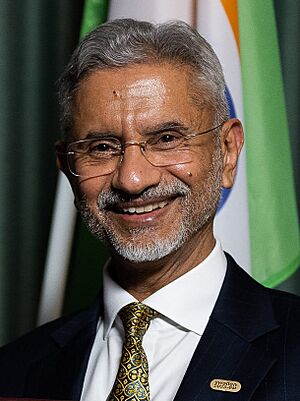
Jaishankar in 2023
|
|
| Minister of External Affairs | |
| Assumed office 30 May 2019 |
|
| Prime Minister | Narendra Modi |
| Preceded by | Sushma Swaraj |
| Member of Parliament, Rajya Sabha | |
| Assumed office 5 July 2019 |
|
| Preceded by | Amit Shah |
| Constituency | Gujarat |
| Foreign Secretary of India | |
| In office 28 January 2015 – 28 January 2018 |
|
| Minister | Sushma Swaraj |
| Preceded by | Sujatha Singh |
| Succeeded by | Vijay Keshav Gokhale |
| Ambassador of India to the United States | |
| In office 1 December 2013 – 28 January 2015 |
|
| President | Pranab Mukherjee |
| Prime Minister | Manmohan Singh Narendra Modi |
| Preceded by | Nirupama Rao |
| Succeeded by | Arun Kumar Singh |
| Ambassador of India to China | |
| In office 1 June 2009 – 1 December 2013 |
|
| President | Pratibha Patil Pranab Mukherjee |
| Prime Minister | Manmohan Singh |
| Preceded by | Nirupama Rao |
| Succeeded by | Ashok Kantha |
| High Commissioner of India to Singapore | |
| In office 1 January 2007 – 1 June 2009 |
|
| President | A.P.J. Abdul Kalam Pratibha Patil |
| Prime Minister | Manmohan Singh |
| Succeeded by | TCA Raghavan |
| Ambassador of India to the Czech Republic | |
| In office 1 January 2001 – 1 January 2004 |
|
| President | K. R. Narayanan A.P.J. Abdul Kalam |
| Prime Minister | Atal Bihari Vajpayee |
| Succeeded by | P. S. Raghavan |
| Personal details | |
| Born |
Subrahmanyam Jaishankar
9 January 1955 New Delhi, Delhi, India |
| Political party | Bharatiya Janata Party |
| Spouses |
|
| Children | 3 |
| Parent |
|
| Relatives | Sanjay Subrahmanyam (brother) |
| Residence |
|
| Alma mater | St. Stephen's College, Delhi (BSc) Delhi University Jawaharlal Nehru University (MA, MPhil, PhD) |
| Occupation |
|
| Awards | Padma Shri (2019) |
Subrahmanyam Jaishankar (born 9 January 1955), known as S. Jaishankar, is an Indian politician and former diplomat. He has been India's Minister of External Affairs since May 31, 2019. This means he is in charge of India's relationships with other countries.
He is a member of the Bharatiya Janata Party (BJP). He also serves as a Member of Parliament in the Rajya Sabha, which is one of India's two main parliamentary houses. Before becoming a minister, he was the Foreign Secretary of India from 2015 to 2018.
Jaishankar joined the Indian foreign service (IFS) in 1977. During his 38-year career as a diplomat, he worked in many important roles. He was a high commissioner to Singapore (2007–2009) and an ambassador to the Czech Republic (2001–2004). He also served as ambassador to China (2009–2013) and the United States (2014–2015). In 2019, he received the Padma Shri, one of India's highest civilian awards.
Contents
Early Life and School
Jaishankar was born on January 9, 1955, in Delhi, India. His father, Krishnaswamy Subrahmanyam, was a well-known Indian civil servant. Jaishankar grew up in a Tamil Hindu family. He has a sister, Sudha, and two brothers, Sanjay and S. Vijay Kumar.
He went to school at The Air Force School in Delhi and Bangalore Military School in Bangalore. He earned a bachelor's degree in chemistry from St. Stephen's College, Delhi. Later, he studied political science and international relations at Jawaharlal Nehru University (JNU). There, he earned his master's, M.Phil., and PhD degrees. He focused on how countries use diplomacy in nuclear matters.
Diplomatic Career (1979–2018)

After joining the Indian Foreign Service in 1977, Jaishankar worked in Moscow, Russia, from 1979 to 1981. He then returned to New Delhi. There, he helped diplomat Gopalaswami Parthasarathy. He also worked on issues related to the United States for India's Ministry of External Affairs. He helped solve a disagreement about the supply of US nuclear fuel to India's Tarapur Power Stations. From 1985 to 1988, he worked at the Indian embassy in Washington, D.C.
From 1988 to 1990, he served in Sri Lanka. He was a political adviser to the Indian Peacekeeping Force (IPKF). From 1990 to 1993, he worked in Budapest, Hungary, focusing on trade. Back in New Delhi, he worked on East European affairs. He also served as press secretary and speechwriter for Shankar Dayal Sharma, who was then the president of India.
From 1996 to 2000, Jaishankar was deputy chief of mission at the Indian embassy in Tokyo, Japan. During this time, relations between India and Japan faced challenges. He helped improve these relations, especially after India's nuclear tests. In 2000, he became India's ambassador to the Czech Republic.
From 2004 to 2007, Jaishankar worked in New Delhi as joint secretary for the Americas. He played a key role in talks for the India–United States Civil Nuclear Agreement. He also helped improve defense cooperation between India and the US. This included working together during relief efforts after the 2004 Indian Ocean tsunami. He also helped launch important dialogues between India and the US on energy and economy.
High Commissioner to Singapore
From 2007 to 2009, Jaishankar was India's high commissioner to Singapore. He helped put into action the Comprehensive Economic Cooperation Agreement (CECA). This agreement helped expand India's business in Singapore. He also oversaw a defense agreement where Singapore keeps some military equipment in India.
Ambassador to China
Jaishankar served as India's ambassador to China for four and a half years. This was the longest term for an Indian ambassador there. In Beijing, he worked to improve economic, trade, and cultural ties between China and India. He also helped manage the Sino-Indian border dispute.
During his time in China, he helped resolve a border stand-off in Ladakh in 2013. He also worked to ensure fair trade for Indian businesses in China. He promoted Indian culture in many Chinese cities.
Ambassador to the United States
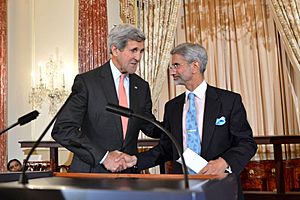
Jaishankar became India's ambassador to the United States in September 2013. He started his role on December 23, 2013. He arrived during a diplomatic challenge involving an Indian diplomat. He helped resolve the situation.
In March 2014, he officially met US President Barack Obama. Jaishankar also helped plan Indian Prime Minister Narendra Modi's first visit to the US in September 2014. He welcomed the Prime Minister and hosted a dinner for the Indian-American community.
Foreign Secretary (2015–2018)
Jaishankar was appointed Foreign Secretary of India on January 29, 2015. This is a very important role in India's foreign policy. His appointment was announced after a meeting chaired by Prime Minister Modi. He served in this role until January 2018.
Minister of External Affairs (2019–present)

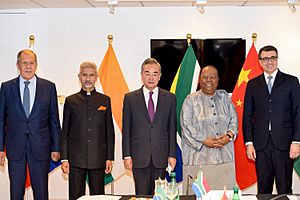
On May 31, 2019, Jaishankar became the Minister of External Affairs. He was sworn in as a cabinet minister on May 30, 2019. On July 5, 2019, he was elected as a Member of Parliament from Gujarat for the Rajya Sabha. He took over from Sushma Swaraj.
In October 2020, Jaishankar and India's Defence Minister, Rajnath Singh, met with US officials. They signed an agreement to share sensitive information and data between the two countries. This agreement had been discussed for over ten years.
In November 2022, Jaishankar met with the Russian foreign minister, Sergey Lavrov. He described Russia as a "steady" and "time-tested" partner for India. He also called for dialogue and peace between Russia and Ukraine. In June 2023, he stated that India would not invite Ukraine to the 2023 G20 summit in New Delhi. He also defended India's decision to buy Russian oil. He said that Europe should understand that India's view on Russia might be different from Europe's.
In January 2023, Jaishankar spoke about the issue of cross-border challenges. He emphasized that the world needs to be concerned about such activities. He stated that India would continue to defend itself. In October 2023, he condemned the Hamas-led attack on Israel as a terrorist act. He also spoke about the difficulties faced by the Palestinian people. He suggested a "two-state solution" through "dialogue and negotiation."
In May 2023, during a meeting in India, Jaishankar strongly criticized Pakistan's approach to cross-border challenges. He stated that India would continue to counter such acts. He also said that India would not have normal discussions while cross-border challenges continued.
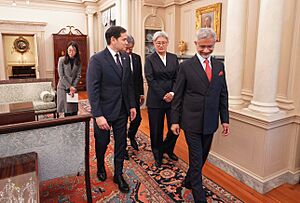
In October 2024, Jaishankar spoke about India's relationship with China. He said that the relationship had not been good because China had not kept certain agreements about keeping the border peaceful. In September 2024, he discussed trade with China. He explained that India is not closed to business from China. However, he noted that it is complex to decide which areas to do business in and on what terms.
Personal Life
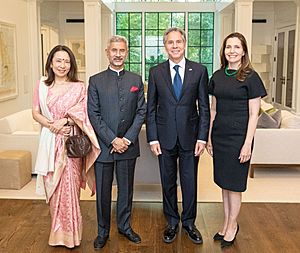
Jaishankar was first married to Shobha, who later passed away from cancer. They met while studying at Jawaharlal Nehru University. Later, he married Kyoko Somekawa, who is of Japanese origin. He met her while working at the Indian embassy in Japan. They have two sons, Dhruva and Arjun, and a daughter, Medha.
Awards and Honours
 India:
India:
 Padma Shri (2019)
Padma Shri (2019)
The Government of India gave him the Padma Shri in 2019. This is India's fourth-highest civilian honor. He received it for his important work in Indian diplomacy and for helping to shape India's global discussions.
See also
- Premiership of Narendra Modi
 | Aurelia Browder |
 | Nannie Helen Burroughs |
 | Michelle Alexander |

